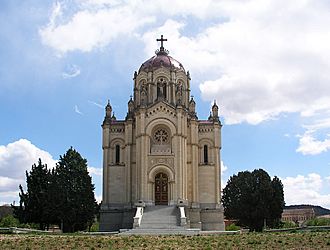Pantheon of the Duchess of Sevillano facts for kids
Quick facts for kids Pantheon of the Duchess of Sevillano |
|
|---|---|
|
Panteón de la Duquesa de Sevillano
|
|
 |
|
| General information | |
| Type | Mausoleum |
| Architectural style | Eclectic |
| Town or city | Guadalajara |
| Country | Spain |
| Coordinates | 40°37′40″N 3°09′22″W / 40.627696°N 3.156065°W |
| Construction started | 1887 |
| Completed | 1916 |
| Design and construction | |
| Architect | Ricardo Velázquez Bosco |
The Pantheon of the Duchess of Sevillano (Spanish: Panteón de la Duquesa de Sevillano or Spanish: Panteón de la Condesa de la Vega del Pozo) is an instance of funerary architecture built in eclectic style in Guadalajara, Spain.
Description
After being granted authorisation in June 1887, María Diega Desmaissières y Sevillano (1852–1916), Countess of Vega del Pozo, commissioned the project for the construction of a mausoleum for herself to Ricardo Velázquez Bosco. The Countess was locally known in Guadalajara rather as duquesa de Sevillano ("Duchess of Sevillano"), after another of her nobiliary titles. She inherited a large fortune, and devoted an important part of it to cultural patronage.
The building has a floor plan shaped like a greek cross, and it is built in stone from Novelda. The iconic dome is covered with purple tiles. The interior of the building displays works by Alejandro Ferrant (a painting on the high altar) and bronze and marble sculptures by Ángel García Díaz, including the four angels flanking the sarcophagus in the pantheon's crypt. The design of the vault inspired a number of works by Velázquez Bosco's disciple Antonio Palacios.
The buildings works ended in 1916, the year in which the Countess died.
See also
 In Spanish: Panteón de la Duquesa de Sevillano para niños
In Spanish: Panteón de la Duquesa de Sevillano para niños

